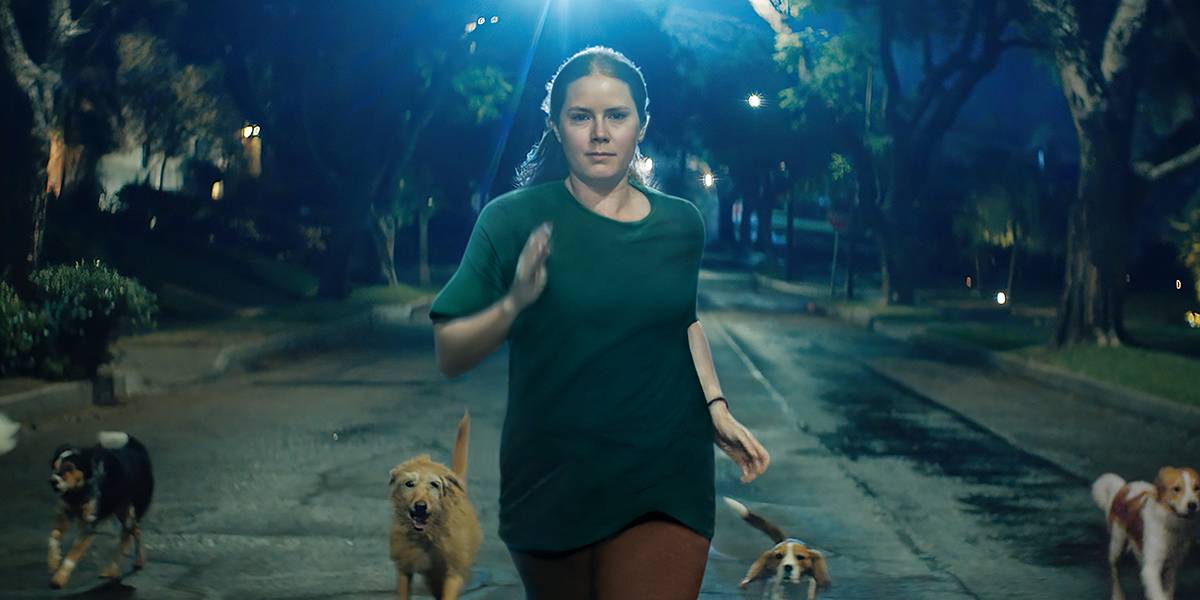NIGHTBITCH as a Manifestation of Female Rage
Going into TIFF this year, Nightbitch was one of my most anticipated films of the festival. I’m a big Amy Adams fan, and while I haven’t read the source material—the novel on which this film is based—the story itself seemed so fascinating. Of course, one’s perspective is often biased when watching it in the same room as the director, the cast, the crew, and surrounded by so many folks who are really into the movie. But it more or less met my expectations, so I’m pretty happy as a result.
Nightbitch, when it is at its best, is hilarious. There are so many moments in this film where the entire audience is laughing—different folks at different moments. There are certain jokes that I think will land a bit harder for mothers, and some may resonate more for those adjacent to motherhood. But underlying all this humor is, as has been emphasized quite a bit by director Marielle Heller, this idea of suppressed, silent female rage—the emotions of motherhood that, for one reason or another, our society has essentially silenced.
We hold this notion that a woman should simply be grateful for being a mother and fulfilling that role. If a woman complains or simply shares her feelings during this time, she is most frequently either explicitly or implicitly chastised for simply being human and having nuanced human feelings. In Nightbitch, Amy Adams is a stay-at-home mom who left her career as an artist to raise her young son full-time. As she progresses in this journey, she notices changes in herself—physically, emotionally, psychologically—all leading her to the conclusion that she is turning into a dog. Of course, this is a metaphor. It’s not about what is “really” happening. This is a film that incorporates clear elements of magical realism to tell a story of motherhood, female rage, and all of these emotions that aren’t always openly talked about.

The first act of Nightbitch is so, so funny. There are some monologues from Amy Adams that are brilliant—some of them taken directly from the novel, essentially these inner thoughts she has but is unable to express out loud. It’s so funny. The interactions that Amy Adams has with her son, played by identical twins (who are so adorable, by the way), are wonderful. But as we enter the second act, I found myself getting a little bit worried. We were beginning to rehash this clear metaphor for motherhood, and while the lines and beats were still eliciting laughter from the crowd, it lost a little bit of steam.
Thankfully, the third act is very strong—not as purely funny as the opening of the film, but very effective in conveying these messages about motherhood and silent struggles. There are so many tremendous lines in this film, and that is, of course, a testament to the screenwriting but also the original source material, as many of these lines are pulled from the novel. Many of the best lines come from the supporting performance by Scoot McNairy, playing Amy Adams’ husband. He’s not a bad man, not a bad person. This was emphasized in the Q&A after the film. It was very important that Scoot’s portrayal was nuanced, and had depth, and he was brilliant in portraying a husband who, while not intentionally, is not supporting his wife, the mother of his son, in the way she needs.
I can already see the headlines from some folks talking about this film as one that is “anti-motherhood” or “anti-men,” and that is almost laughable. These takes exist because the very pain that is central to Amy Adams’ character is rooted in this cognitive dissonance. The fact that she loves her son so deeply, that she sees so clearly the beauty of motherhood, but yet is struggling—that sort of self-doubt and negative self-talk creeps in. When there’s this understanding of how beautiful the experience is, it is simultaneously paired with feelings of pain, anger, and confusion.
While Nightbitch is definitely geared toward women in terms of highlighting an experience that is unique to mothers, if you have any sort of empathy, it’s pretty easy to latch onto the emotional experience here. And as Scoot McNairy so emotionally and eloquently explained in the Q&A—he was on the verge of tears during this discussion, which I found quite beautiful—just hearing him talk about his experience working with these amazing women and just listening. Just actually shutting up and listening.
At the end of the day, Nightbitch is not a perfect film. Amy Adams is strong, Scoot McNairy is strong, and the overall thematic messaging is strong. But the second act loses some steam, and the metaphor becomes a little repetitive at times. Still, the ability of Marielle Heller to pretty seamlessly blend the comedy with the rage, in such an absurdist visual language, makes this film a worthwhile experience.
There are elements of this film that I know, almost undoubtedly, will make so many people feel heard in a way they maybe haven’t before—which is wild because it’s a film about Amy Adams turning into a dog.
More Videos HERE
Full Written Reviews HERE





Pingback: 10 Most-Anticipated Films Playing at VIFF 2024 (Vancouver)